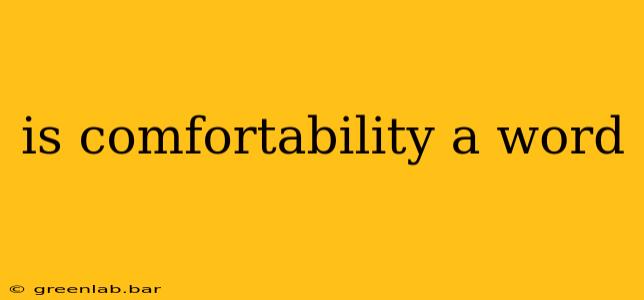Is "Comfortability" a Word? A Deep Dive into Usage and Alternatives
The question of whether "comfortability" is a word sparks debate among grammar enthusiasts and language purists. While not traditionally found in many dictionaries, its usage is growing, reflecting the evolving nature of language. This article explores the nuances of "comfortability," its acceptability in modern writing, and offers superior alternatives depending on the context.
Understanding the Linguistic Landscape
The English language is dynamic. New words emerge, old words fall out of favor, and the meaning and acceptability of words constantly shift. "Comfortability," formed by adding the suffix "-ability" to "comfortable," follows this pattern. While it grammatically adheres to established word-formation rules, its infrequent use in formal writing has led to its categorization as less common or even non-standard by some.
Why Some Consider "Comfortability" Problematic
The main objection stems from the already existing and widely accepted adjective "comfortable." The noun form "comfort" sufficiently conveys the idea of ease and relaxation, making the addition of "-ability" redundant for many. Using "comfortability" might sound awkward or overly formal in certain contexts, potentially detracting from the overall clarity and flow of writing.
When "Comfortability" Might Be Acceptable
Despite its questionable status, "comfortability" isn't necessarily grammatically incorrect. It could be acceptable in informal settings, particularly when emphasizing the state of being comfortable, rather than simply the feeling of comfort itself. For example, one might argue that "The comfortability of the new chair was undeniable" subtly distinguishes between the inherent quality of the chair (its comfortability) and the subjective experience of sitting in it (feeling comfortable).
Superior Alternatives to "Comfortability"
In most cases, clearer and more concise alternatives exist, avoiding any potential ambiguity or stylistic concerns. Consider these options, tailoring your choice to the specific nuance you wish to convey:
- Comfort: Often the most straightforward and effective choice. "The comfort of the new chair was undeniable."
- Ease: Emphasizes the lack of difficulty or strain. "The ease with which he handled the situation was impressive."
- Convenience: Highlights the practicality and usefulness. "The convenience of online shopping is appealing to many."
- Relaxation: Focuses on the feeling of rest and freedom from tension. "The spa offered a blissful state of relaxation."
- Well-being: A broader term encompassing physical and mental comfort. "Ensuring the well-being of our employees is a priority."
Conclusion: Context is King
The ultimate decision of whether to use "comfortability" hinges on the specific context and the desired effect. While not entirely incorrect, its less common usage and the availability of superior alternatives usually make it a less desirable choice in formal writing. Prioritizing clarity, conciseness, and the use of established vocabulary will enhance the overall quality and impact of your writing. In most situations, selecting one of the alternatives listed above will result in a more polished and professional piece of work.

